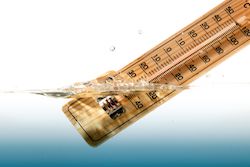What Is The Ideal Temperature For A Swimming Pool?
 When it comes to enjoying your swimming pool, there are never-ending discussions over what’s the best pool temperature. No one wants to dip their toe in cold water but at the same time swim in a pool which is too warm, and it may send you to sleep.
When it comes to enjoying your swimming pool, there are never-ending discussions over what’s the best pool temperature. No one wants to dip their toe in cold water but at the same time swim in a pool which is too warm, and it may send you to sleep.
To keep all your family and guests happy, experts have come up with an optimal temperature. Across the board, it’s agreed the best temperature for a swimming pool is between 27 and 29 degrees Celsius.
Too Hot
There’s no denying that warmer water is more inviting, but while to some it may seem lovely stepping into warm jacuzzi-like water, too hot and it could put your health at risk. Hot pool water can cause people to overheat and become dehydrated and may also result in cramps. No one wants to put family and guests at risk.
Bacteria loves warm water, the warmer, the better, so if it gets too warm spores will settle on your pool walls and spread rapidly. Bacteria in your pool will cause your chlorine to work harder and will affect your PH balance, causing your pool chemistry to go askew.
Toddlers and the elderly are less tolerant of cold water so you may want to raise the temperature a couple of degrees if they’re regulars in your pool.
Too Cold
A pool which is too cold will induce shock, and that can create problems with a body’s internal organs.
Experts say temperatures below 10 degrees, can cause loss of breathing. Coldwater can prompt a ‘fight’ or ‘flight’ reaction and will cause someone to produce extra adrenaline. Blood vessels may narrow, and as a result, more blood will head to the chest and cause pressure on the heart. The worst-case scenario it could even lead to a cardiac arrest.
If you like to swim lengths and use your pool for exercise, you may want the pool slightly cooler at 26 degrees Celsius. Cooler water is better for competitive swim training as warmer water may lead to dehydration, but there’s still not enough evidence to suggest that cold-water swimming is a great way to burn fat.
Conserving Pool Temperature
Heat loss will occur overnight when temperatures dip, so outside of the main summer season, you may want to cover your pool with a pool cover. Solar ones are the best as they help convert some of the heat from the sun into heat in your pool.
Keep a close eye on the temperature of your pool by using a thermometer or checking the temperature on your solar gauge. If you have a swimming pool heater, a built-in thermostat will give you a constant reading. Remember an optimum temperature between 27 and 29 degrees Celsius is best.
At Barrier Reef Pools Perth, we have a range of affordable fibreglass pools in different sizes and styles. With three display centres in O’Connor, Joondalup and Mandurah, why not come and see what they look like for yourself? You can also follow us on Facebook and see the variety of pools we’ve recently installed in backyards.
